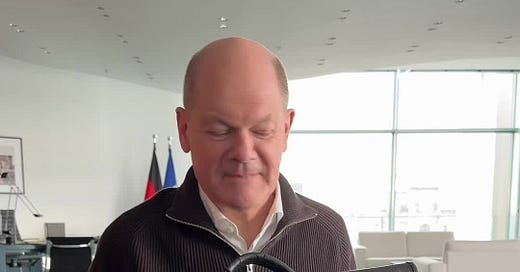Someone wrote me: Apropos of Czechia, I wonder if “Türkiye” will ever make its way into everyday English. Also, I found it interesting how the media continued to use the name “Twitter” for a long time after it had been renamed to “X”, perhaps in defiance to its new owner. This renaming business is intriguing.
I found myself muttering to myself just yesterday (watching a video showing the Crown Prince of Saudi Arabia and Recep Tayyip Erdoğan at a summit meeting), the word “Turkeyyy-yee.” On Al Jazeera, they have a standard end to some of their features which exhorts viewers to look them up on “Twitter—nobody really calls it X do they?” I don’t call it either, but have just watched the most boring movie ever since I posted a video of my ex rotavating the side lawn in 2003. It’s of Olaf Scholz’s briefcase:
I think I referred to Côte d’Ivoire, which they once asked all English people to say for Ivory Coast. Right. So, how do you say a circumflex in English? (For that matter, how do you say it in French?) Is the final e pronounced? Is it Iv as in give, as in ivy or as in leave (excuse me?)? Sorry, it was English that this word is for, yes? So, it must be pronounced according to the rules of English pronunciation, no? Kot-deave-war-e.
Then, Türkiye. Right, so, the diaeresis being a function of splitting a diphthong into two constituent letters (whereby naïve becomes nigh-eve, instead of knave), what is the function of the diaeresis on the ü? Don’t forget, this is not a Turkish word at this stage, it is an English word. We have no such single vowel ü, so the word is utterly unpronouncable. We will just leave it silent.
“Hello, I have just booked my annual holidays to Anatolia, in ........”
“.......! That sounds nice!”
Bit silly. How about:
“Yes, never been before and always wanted to go to [the country in Asia Minor formerly known as Turkey]!”
Of course, the adjective “Turkish” is now also redundant, and to be deleted from the entire English language. We will henceforth be munching on “Türkiyeish delight”. Except we can’t pronounce üs so it’ll be “Adjectiveofthecountryinasiaminorformerlyknownasturkeyish delight.”
Yes, but they haven’t changed their national air carrier’s name. It’s still Turkish Airlines:)
Well, of course they wouldn’t want to appear provincial, now, would they?
The first time I ever saw a paprika was when I got one free on a train parked at Leeds City station back in about 1970: touring the UK to promote tourism in Holland. Brochures and leaflets and maps and whatnot all extolling the virtues of Holland.
Now what do they want? “O, ja, pleeze call uz THE NETHERLANDS. With a singular verb, don’t forget. We changed our minds since we sent the train around England.”
“Er, that’ll be the train you sent around the United Kingdom of Great Britain and Northern Ireland, I think you mean?”
“Misschien.”
If you know French, and you know Luis d’Antin van Rooten’s Mots d’Heures: Gousses; Rames (or Words of Hours: Pods; Oars), which I was introduced to by a French assistant with a humorous turn during my A-level French studies, you will have no trouble reciting the following poem. In English, that is.1
Un petit d’un petit
S’étonne aux Halles
Un petit d’un petit
Ah! degrés te fallent
Indolent qui ne sort cesse
Indolent qui ne se mène
Qu’importe un petit d’un petit
Tout Gai de Reguennes.
If you know that, then you certainly know Latin?
CIBILI CEUM GO
FORTIBUS ES INERO
NOBILI DEUS TRUX
VATIS INEM CAUSEN DUX2
And, while we’re at it, how’s your Swedish?
It’s, of course, the nursery rhyme Humpty Dumpty as French nonsense.
See, Billy, see them go!
- Forty buses in a row!
No, Billy, they is trucks!
- What is in them?
Cows and ducks!






Yes, language can be baffling, even if it is your native tongue - and - it depends o which part of the same country in which you are traveling (:-)